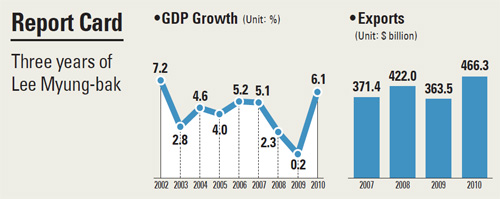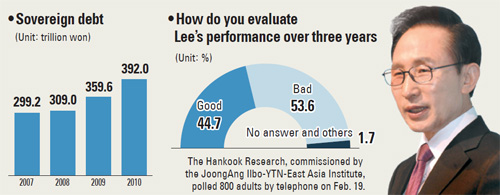Press Release
‘In Korea’s culture of boss politics, the president talking with the opposition is essential.’

Three years ago today, President Lee Myung-bak took office vowing to be an “economic president.” And he proved true to his word, guiding Korea through the global economic crisis and bringing it back to strong economic growth. His approval ratings are high.
But the lowest mark on the Lee administration’s report card is how he plays politics. And in the remaining two years of the former business executive’s term, he’ll need sharper political skills than before - particularly an ability to communicate with the public and negotiate with the opposition - to avoid becoming a lame duck.
“Lee is a very good example of a CEO leadership,” said Choi Jin, head of the Institute of Presidential Leadership. “Pragmatism, effectiveness and a driving force are the strengths of a CEO-style leader, but the lack of communication and emotion are the weaknesses.”
His main challenges ahead are getting the National Assembly to ratify free trade agreements with the United States and the EU. He also wants constitutional amendments to end the presidency’s one-term limit and to divide power between the president and prime minister, which will surely face major opposition in the Assembly.

And without the major diplomatic achievements that marked Lee’s first three years, like hosting the G-20 Summit in Seoul last year and boosting ties with the U.S., bread-and-butter issues will be more important to the general public in the next two years.
“The people were preoccupied with many grand events such as the hosting of G-20 Summit last year,” said a senior Blue House official. “But this year, we won’t have a major event that will unite the people, while measures to fight inflation and skyrocketing housing prices and to create jobs became more and more important. And they are issues directly linked to people’s everyday lives, and we understand communicating with the public is crucial.”
“This government lacks the ability to listen to the public,” said Kang Won-taek, professor of political science at Seoul National University. “People think what they are interested in and worry about are different from what the president is interested in and worries about. So the people feel a great distance from the president.”
Recent polls show the public approves of Lee’s performance as the “CEO president.” According to a Feb. 19 poll by Hankook Research, 44.7 percent of the public rates his performance positively, which is spectacular compared to his predecessors’ ratings at the same point in their terms. And the people expect Lee to continue to be strong on economic issues.
Asked what Lee’s priority should be for this year, 20.7 percent said it should be shrinking income inequality, while 19 percent said more economic growth. Another 15.9 percent said he should work on improving the quality of life.
A fewer number of respondents said Lee should work on boosting national security, unifying the people, improving inter-Korean relations and education and political reforms.
Analysts praise Lee’s achievements bringing Korea’s economy through the global financial meltdown. But they say his weak political touch is the president’s Achilles’ heel.
“Lee simply lacks the ability to persuade, compromise and communicate,” said Kang of Seoul National University. “If he didn’t want to be a political leader, he should have delegated the job to the ruling Grand National Party and they could talk and negotiate with opposition parties. But he didn’t. State affairs, therefore, became unproductive in many ways.”
In his first three years, Lee faced significant political failures on major projects. Last year, Lee wanted the National Assembly to scrap a law mandating a new administrative capital in Sejong City, which would have moved most government ministries out of Seoul. Opposition from other parties and a faction in his own GNP scuttled that plan.
The failure of the so-called Sejong City revision led to the resignation of Prime Minister Chung Un-chan and widened the factional rift within the GNP.
Lack of communication and compromise with the National Assembly, where his party has a majority, also resulted in a series of failures to appoint top government officials. During Lee’s three years in office, he made 60 requests to the legislature to confirm appointments of top officials, but eight nominees were either rejected by the Assembly or bowed out after fierce and embarrassing attacks at confirmation hearings. Last year alone, four of Lee’s nominees failed to get confirmed, including Kim Tae-ho as prime minister and Chung Tong-gi as head of the Board of Audit and Inspection.
“Lee’s strengths were most effective in foreign affairs, while in domestic affairs he had a series of political debacles,” said Choi of the Institute of Presidential Leadership. “Many of his achievements, such as hosting the G-20 Summit, exporting nuclear reactor technology and bolstering the alliance with the United States, were in the arena of foreign affairs.”
The Grand National Party and the Blue House admit the president’s communication skills are a shortcoming that need improvement.
“During the past three years, the GNP and the government tried their best to overcome the economic crisis and stabilize the ‘livelihood economy,’ but there is still more to do to make the people really feel the changes” said Ahn Sang-soo, the GNP’s chairman. “We must improve communication with the people, particularly with civic groups. And the party, the government and the Blue House must cooperate to create policies based on the people’s demands and desires and implement them proactively.”
“Effective communication between the Blue House and the party, cooperation with the opposition parties and efforts to unite the people were lacking,” said Representative Cho Hae-jin, spokesman for GNP. “So Lee should focus on reconciling with his opponents in the next two years,”.
The Blue House also admits the need for better communication with the public. “Although Korea was one of the first countries to overcome the global economic crisis and the nation’s prestige was heightened by the successful hosting of the Group of 20 Summit last year, there were opinions that the Lee administration was weak in uniting society and in inter-Korean relations,” the Blue House said in a press release marking the administration’s third anniversary. “We will try to explain to the public the major policies implemented in the past three years and right our shortcomings.”
Opposition parties all criticize the Lee administration for its poor communication and unwillingness to compromise.
“Lee turned the nation into a landscape of conflicts over his key projects, such as the four-rivers restoration project and Sejong City,” said the DP’s floor leader, Park Jie-won. “And in such a situation, Lee keeps bringing up constitutional amendments, and I deplore this. Instead of beginning a new project, I want him to spend the remaining two years of his term to conduct state affairs with communication and harmony.”
The conservative opposition Liberty Forward Party agreed. “During the past three years, the people were completely ignored,” said Park Sun-young, the party’s spokeswoman.
It remains to be seen how much Lee can reinvent himself as a political leader. “I was not a politician, but a worker,” Lee said in a television appearance on Feb. 1. “Just as when I ran for Seoul mayor, I won the presidential election with pledges to improve the ‘livelihood economy’ and employment as an economic president, so I have taken a different path from the country’s long political tradition. And that’s why the people chose me.”
For many outstanding and contentious issues, including selecting the sites for a new international science complex and a new hub airport in the country’s south, Lee said the decisions wouldn’t be political but pragmatic.
Analysts say that Lee has to start recognizing his political opponents as partners in state affairs. “In Korea’s culture of boss politics, the president talking with his opponents is essential,” said Choi of the Institute of Presidential Leadership. “It is an important tool, but it’s gone missing for the past three years.”
In September 2008, Lee met with then-Democratic Party Chairman Chung Sye-kyun for an official summit at the Blue House. Since then, he’s held no talks with opposition leaders. During his Feb. 1 TV appearance, Lee said he was willing to sit down with opposition leaders, but it hasn’t happened yet.
Experts also said mending the rift with former GNP Chairwoman Park Geun-hye was also an urgent task. Park has her own faction within the party that often disagrees with Lee’s initiatives. “For the past three years, the factional strife between Lee and Park supporters has put a strain on Lee’s agenda,” said Choi. “And Lee is more responsible for the situation. Mending the rupture and building trust with Park and her loyalists are key for Lee to delay becoming a lame duck and for the GNP to win another presidential victory.”
The next presidential elections are at the end of 2012.
“In the current political universe, Park is no longer a rising sun. She is already above the horizon,” Choi said. “There are now two suns in the political sky, and imagine the aftermath on Earth and on the people when they collide. Now it is time for Lee to find and use his political skills to avoid a collision course for the next two years.”
※ Quoted the Graph from EAI Issue Briefing on Public Opinion No. 94
Related Korean Article [Direct to Link]